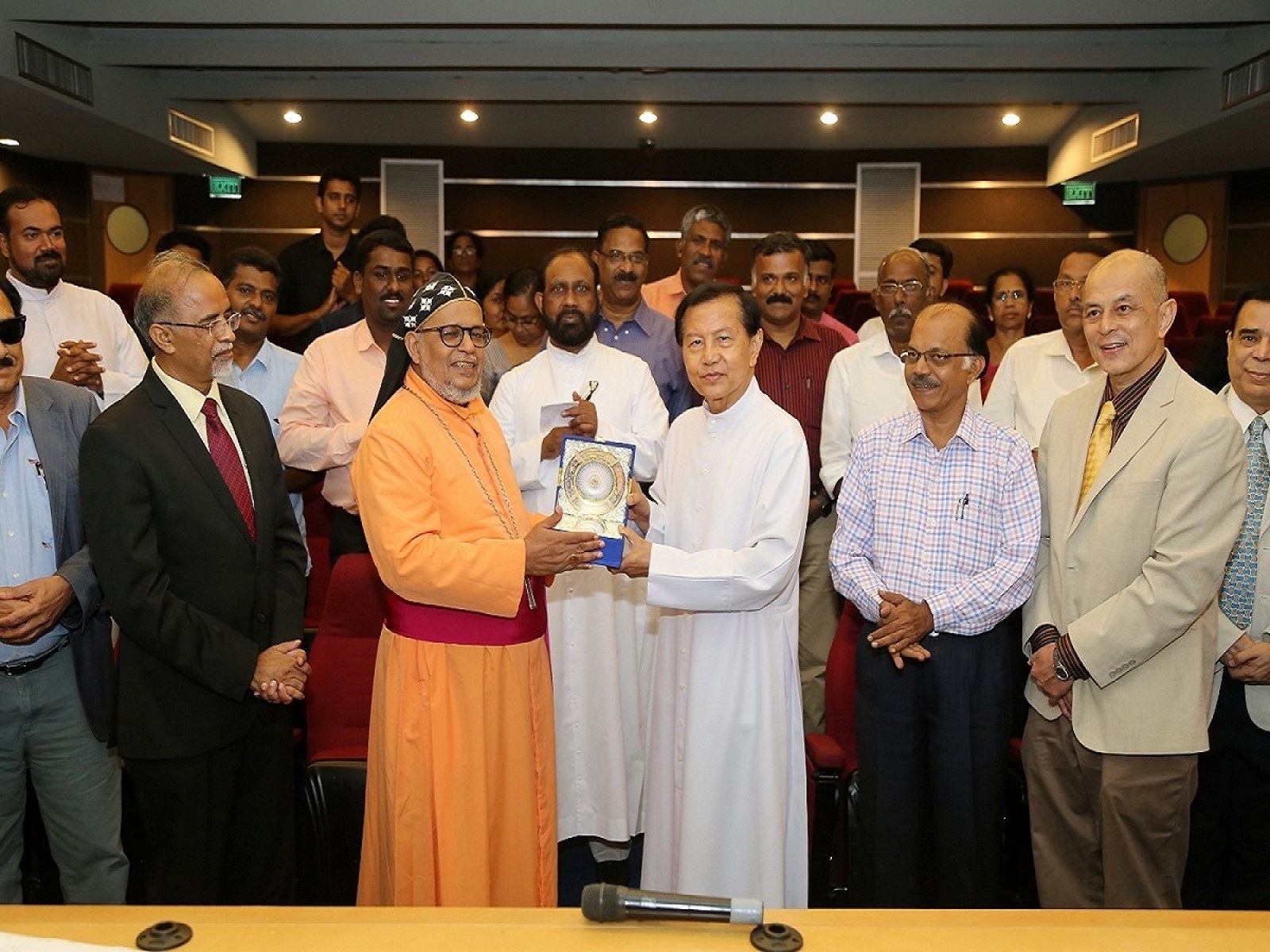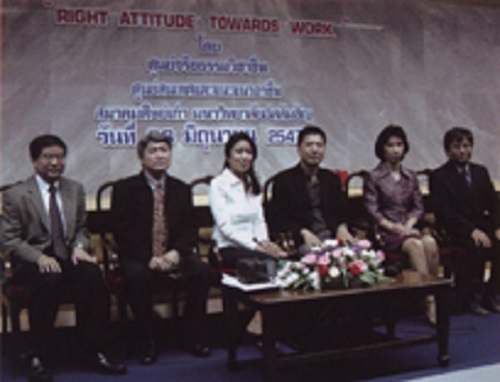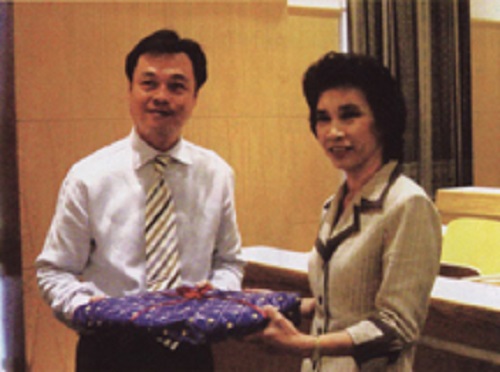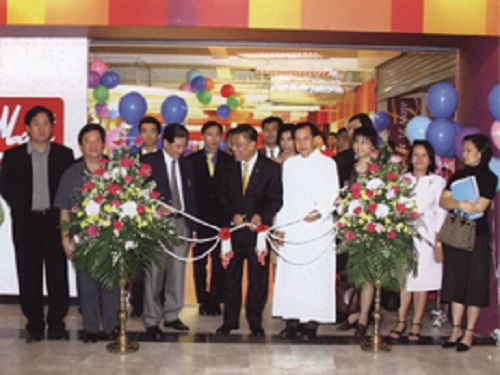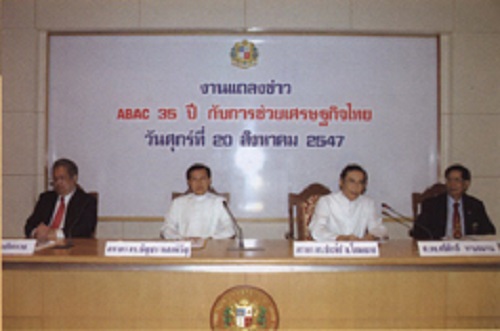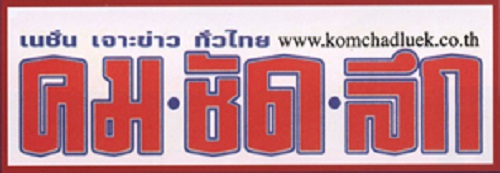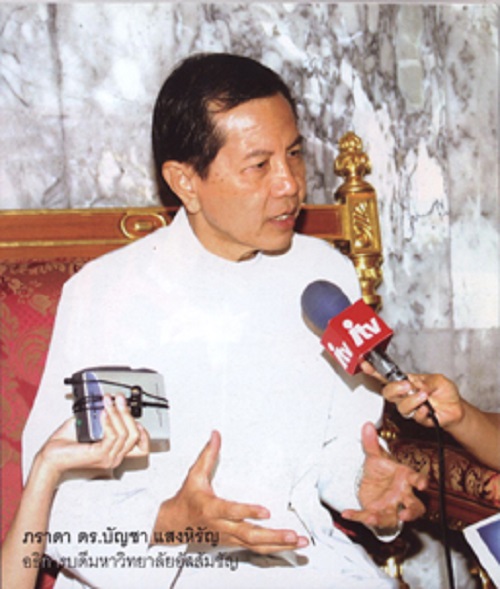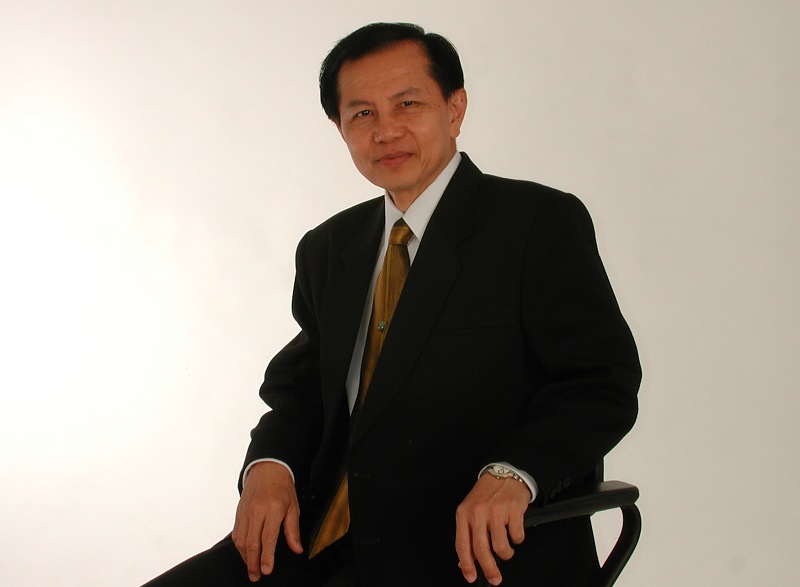ABAC and the new tasks of the President*
(*reproduced from ABACA PROFILE of October-December 2002.)
For over 40 years, Reverend Brother Dr. Bancha Saenghiran has dedicated his physical strength and mental powers to fulfilling his duties as a Brother of the St. Gabriel's Foundation of Thailand. He has developed confidence in his knowledge, talent and vision, thanks to his vast experience working at various institutions operated by the Order. Today ABAC Alumni Association proudly welcomes his recent appointment as President of Assumption University and has requested and interview with him. Here is what he has to say about his visions and his responsibilities.
The establishment of AU as a world-class university:
" The duty before me is mainly to continue the work begun by the former Rector, Reverend Brother Dr.Prathip Martin Komolmas, who has, at this moment, been appointed President Emeritus by the University Council. Our mission is to continue to develop our university into a global institution. If anyone should ask at this point when this will be achieved, the answer is that it will take time to effect changes for the better. We must move forward, step by step, in accordance with the university’s vision and mission, working methodically and patiently to realize the philosophy of the Brothers of St. Gavriel. At present we have students coming from within the country and overseas to pursue studies here, and their numbers have been growing steadily. But most of all, We can regard the successes of our graduates as proof of the quality and high standards of our university. In the last five to six years, Assumption University graduates have enrolled in leading universities around the year 2002, two graduates have been admitted to the MBA program at Harvard University, and one student at MIT. Besides this, many of our graduates were able to obtain jobs at multinational corporations. "
" AU attaches great importance to the quality of its teachers, the methodology of teaching, learning and research. These go hand in hand. But in addition to attracting qualified teachers, and to providing a good teaching and learning environment, we must improve facilities for our students. It is not possible to continue in the crowded conditions we have at Hua Mak Campus, where more than 18,000 students were crowded within a 16-rai plot. Therefore, we must continue the work of the former Rector to develop the Bang Na Campus. Forty percent of this has now been completed. With more space and better surroundings, our students can achieve quality, knowledge and develop their potential. "
The education of graduates who possess knowledge and integrity:
" One special characteristic is that we use English as the language of instruction Our courses are also unique because business management is at the base of every program we teach, and our graduates are trained as managers, with solid theoretical knowledge as well as a practical background. Moreover, professional ethics and community service will ensure that they are graduates with integrity. This may not sound so different from other institutions, but we regard these as unique features of a Catholic university. It means that, in the context of the Catholic university, the administrators must pay attention to morality, ethics and good behavior, all important elements of our education. Other universities are know to have international programs, large facilities and students from overseas, but our values are defined by the Christian concepts of love, kindness, and sacrifice which we, endeavour to instill in our students. The continuous interaction between administrators, faculty, personnel and students, not only in the classroom but in all aspects of university life are significant. "
Teaching students how to learn about new things throughout their lives:
" Students often say it’s hard to study at AU, therefore they don’t have time for other activities. It may be true that studying here is difficult because English is the medium of instruction, but this is only in the beginning when students need to adjust to a new language. However, I often see that students are free and don’t know what to do so they simply do nothing or use the telephone a lot. It’s not that they don’t have free time. But they don’t know how to manage their time and use it to their advantage. They forget that “Time is Money,” or simply that “Time and Tide Wait for No Man.” If they learn the importance of time management, they will always acquire new ideas. Unity, for example, is not the result of activity alone, it is the result of many things. Attending classes, and going home, is a basic activity of students and they have known this since high school. But at university level, they have to adjust to life and their ways of thinking, and change from students who learn from teachers, to students who know how to look for knowledge and learn how to learn by themselves. There are different methods of learning how to depend on oneself. The teacher becomes the manager who encourages students to study and look for solutions to problems, because in the future there will be no teacher to stand by them. Students must learn to teach themselves, and adjust their behavior to their surroundings. All these things cannot be learned through specific programs, however carefully they may be chosen. On the contrary, activities often lead to fights and quarrels, and the effect can be adverse to its real aim. But if we acquire knowledge, and apply this to our lives, we have really learned and gained something. Simply think of how much we had to adjust when we were young. Nobody wants to brush their teeth because it hurts, but knowing that it is necessary as well as important we keep it up, we adjust, and it becomes a regular habit and a part of our lives. "
The creation of an international teaching learning environment:
" Many people keep asking why AU does not have a faculty entirely of foreigners. In order to answer this question, let us first look at what it means to study at an international level. Faculty at this university is selected according to their expertise in their fields; their educational qualifications and the universities where they have studied; as well as their ability to teach in English and use English efficiently. It is not necessary to look for foreign teachers only, because in the world arena, graduates will meet with people of various nations and cultures. We have a truly international atmosphere here with both teachers and students from some 58 countries. At one time in Thailand we went crazy about foreigners, who were understood to be from Europe, and considered as good as their products. But in this global society, when we buy goods from Europe, they are likely to be made in China, or Korea, or Thailand, but we don’t know it, and believe that everything foreign is good. On December fourth, His Majesty the King suggested that Thai people should breed Thai dogs and train them. Before that nobody ever thought about it. His Majesty also praises Thai wisdom, but the word “local wisdom” should be more appropriately translated as “local knowledge.” Americans and Europeans are competent in their own languages, but Thai people can acquire the skill and the pronunciation of native speaker by practicing outside class, by watching news such as CNN, CNBC and BBC. One thing required of our teachers is international intelligibility. If we watch CNN or BBC we see many Asian newscasters who speak perfect English. Therefore, let us not create false values, but let us look toward to creating a world-class standard of education and to fulfilling the need for knowledge to serve our international community. "
The development of technology to facilitate the teaching-learning process:
" Our first faculty was Business Administration, and then when we look at the foundation of all our studies, we discern that it is Liberal Arts, an essential part of education if we aim to develop human beings, because we are not born just to work. Some may think that studying means the acquisition of skills to be able to work, but we also need people in society who are able to build a happy and harmonious life. This is what people need, what the nation needs and what the world needs. What Business Administration and Arts had developed to a certain point, the university saw the need for teaching computer management, which was the first course of its kind in Thailand. Since then, the university has concentrated on building technology resources because the mew IT Building at Bang Na campus is proof of the progress we have made with information technology, in particular since we are the founders of the Internet Society, the only one in the Asia Pacific region. Whether IT is beneficial or harmful depends on the user, of course. "
" Language is important at the university, because in an international world we cannot use Thai. For this reason, English, French, Chinese and Japanese are major language courses so that our students can communicate efficiently in the business world. With their background in business, management and information technology, the students can enter the current of globalization without fear. "
Helping to create a network of friends, societies and business:
" A good network is important, such as a network of organizations and a network of students. It works horizontally and vertically. Just like the Internet, which we can hook up if we are looking for information. Students should form a network to consult with each other. There is the story of an ailing person who had been looking for a cure for a long time. Then one day he posted his symptoms on the Internet, and a doctor who read it was able to suggest a successful cure. There may be many such important matters, whether it is a problem at work, or a problem with a relationship. In this age networking is important. It can open up the world for both business and a happy way of life. Both students and parents share the opinion that studying at Assumption University has enormous benefits, for here they will meet friends and create opportunities for future networking. "
The development of ethics to maintain happiness and success:
" In order to sustain continuous happiness, three things are very important.
First, keep learning all the time. The completion of your studies at a certain level is not an ending. Many stop learning after they nave obtained their degrees, but in reality, we must keep learning after they nave obtained their degrees, but in reality, we must keep learning all of the time. We should continue reading and solving problems.
Second, learn to adjust. The world keeps changing all the time, so we must keep up with events and adjust ourselves to new circumstances. If we do not change we will be like elephants. The dinosaur is already dead, and now the elephants are in danger of becoming extinct because they are being driven from their habitats. If we cannot adjust we will lose. Also, with technology, if we do not know how to use it, we cannot keep abreast of progress.
Third, we must have morality and ethics, otherwise the world will be in trouble. These three things are important, in particular ethics, otherwise religion will be eliminated and life will become meaningless. As men live together they must know what is right and wrong, they must make ethical decisions and be able to sacrifice. In society we depend on each other and must love one another. Then we will be clever and good and happy: clever to survive in this changing world, good at heart and with integrity, so that we will always be happy. "


